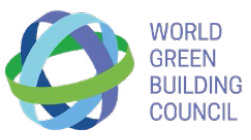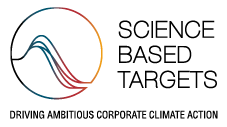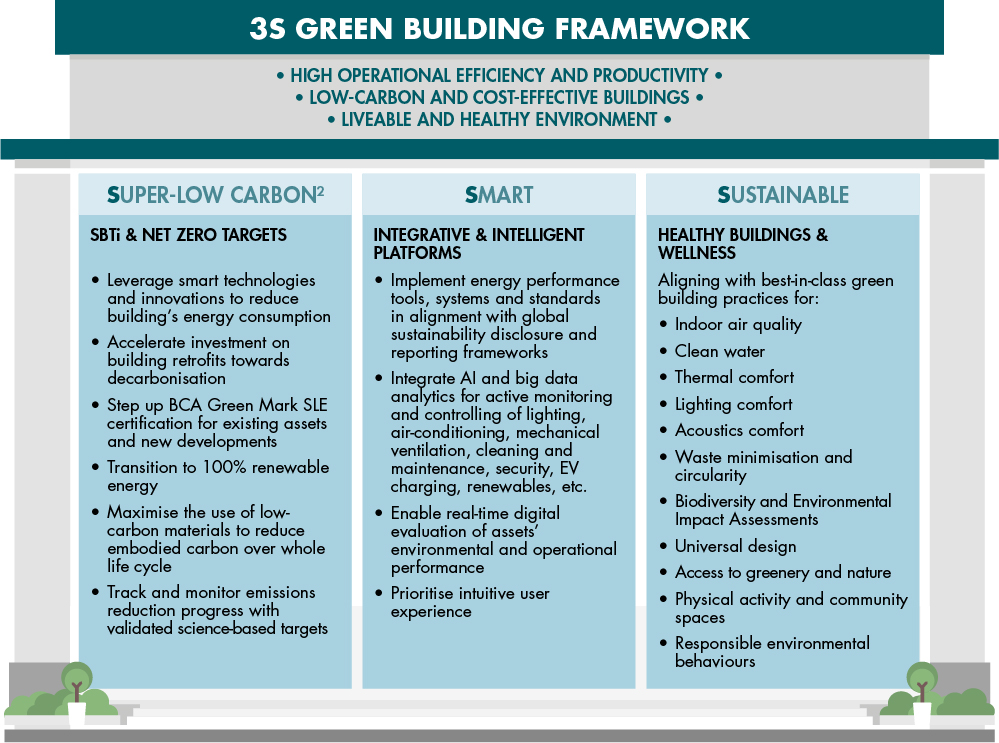DECARBONISATION – ACHIEVING NET ZERO IN PHASES BY 2030 AND 2050
The net-zero commitment has remained as our green building and energy management priority since the Company’s pledge to the WorldGBC Net Zero Carbon Buildings Commitment in February 2021; and the renewal of our carbon reduction targets by SBTi in December 2021. In the pursuit of a low carbon future, we remain focused on driving green building innovations whilst creating value for our business and stakeholders. At COP27, the Company joined over 50 global companies in making a joint Action Declaration on Climate Policy Engagement. Through this, we reaffirmed our approach towards taking climate action by aligning with the Paris Agreement whilst working with our industry partners, trade associations and policymakers.
During COP28, the Company announced that we were the first corporate to secure the OCBC 1.5°C sustainability-linked loan, a three-year £200 million (approximately S$338.2 million) revolving credit facility that is pegged to annual decarbonisation targets. It aims to mobilise capital to drive action to attain our SBTi-validated carbon reduction targets.
The table is scrollable to right
| Net Zero Commitment | CDL’s Commitment | Action Taken | Achievements |

WorldGBC Net Zero Carbon Buildings Commitment New developments and 13 Singapore assets (as of February 2021)
|
The following targets have been set and endorsed by our senior management to take our green building ambitions to the next level:
|
In 2022, the Company updated our 2030 targets upon SBTi’s successful validation of our carbon reduction targets in 2021.
Operationalised revised Future Value 2030 Sustainability Blueprint (FV2030) interim 2023 annual targets in Q2 2023, endorsed by management. The FV2030 targets have incorporated more stringent SBTi-validated targets based on a 1.5°C warmer scenario, which are integrated with the Company’s carbon reduction pathways mapped under our WorldGBC Net Zero Carbon Buildings Commitment. In 2023, the Company submitted our interim progress to WorldGBC. |
One of over 50 global corporations to commit to greater action in strengthening climate policy engagement, in line with the Paris Agreement at COP27. |
 |
By 2030, against a 2016 base year, we will:
|
2021: Renewed SBTi-validated targets aligned with a 1.5°C warmer scenario 2019: One of 87 pioneering signatories to the Business Ambition for 1.5°C campaign led by UNGC, SBTi, and We Mean Business coalition 2018: First real estate company in Singapore to set SBTi-validated targets based on a 2°C warmer scenario |
|

|
The following targets have been set and endorsed by our senior management, to take our green building ambitions to the next level:
80% of Singapore’s buildings (by GFA) to be green by 2030
80% of new developments to be SLE from 2030
80% improvement in energy efficiency (from 2005 levels) for best-in-class green buildings by 2030
|
|
Green Mark: The Company has amassed a portfolio of 123 BCA Green Mark certifications for our developments and office interiors. This makes us one of the leading private developers with the most BCA Green Mark Platinum awards since the launch of this scheme in 2005.
BCA Green Mark Super Low Energy Awards In 2023, the Company achieved:
|
| [1] | SBTi only requires companies’ Scope 3 targets to cover 66% of their Scope 3 emissions. For the Company, category 1 (purchased goods and services) and category 15 (investments) have reduction targets as these categories cover more than 80% of our Scope 3 emissions |
| [2] | Investment refers to the Group’s six key subsidiaries: CBM Pte Ltd, CDL Hospitality Trusts (considered as associate of the Group from 2023 onwards), City Serviced Offices, Le Grove Serviced Residences, Tower Club Singapore, hotels owned and managed by M&C |
| 2 | Singapore Commits to Achieve Net-zero Emissions by 2050 and to a Revised 2030 Nationally Determined Contribution; Public Sector and Jurong Lake District to Lead, NCCS Singapore |
| 3 | Media Release: Initiatives to Support Transformation in the Built Environment Sector |
| 4 | The Company achieved three SLE awards in 2023 for Republic Plaza, Tembusu Grand, and Lumina Grand |
| 5 | Comprises residential, retail, office and hotel |
3S Green Building Framework
Introduced in 2020, the CDL Smart, Sustainable and Super Low Carbon (3S) Green Building Framework is a key enabler founded on two critical drivers – innovation and digitalisation – to support CDL’s business growth and transition to net zero operation. This holistic framework is aligned with the BCA Super Low Energy (SLE) buildings requirements, as well as international standards for advancing health and well-being in buildings. In 2021, the 3S Green Building Framework was updated to include embodied carbon management. This aims to align with the WorldGBC’s whole life carbon vision in the expanded Net Zero Carbon Commitment.5
| 5 | Advancing Net Zero. World Green Building Council, 29 November 2021. |

